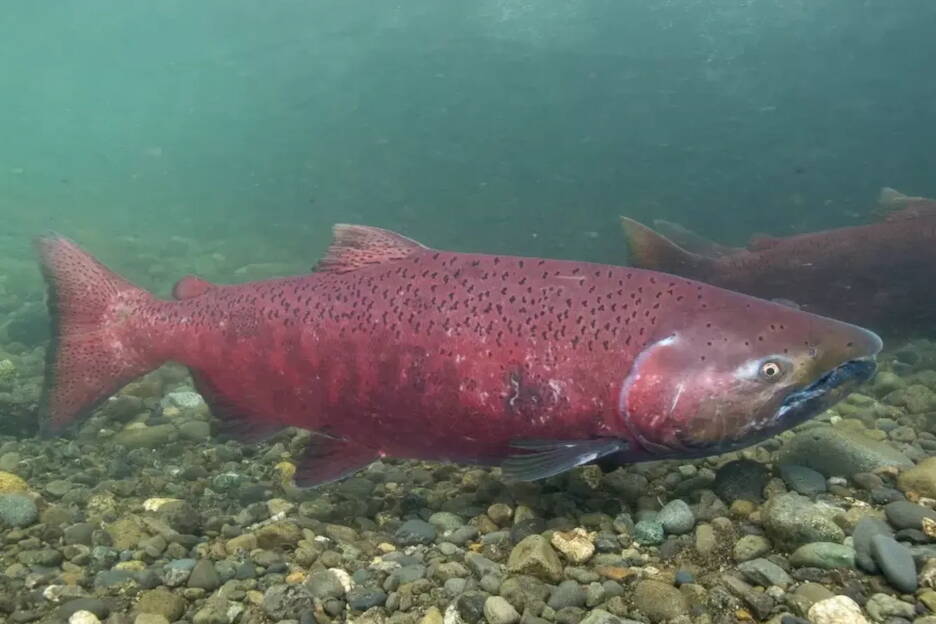A Washington state-based environmental group says it’s filing a petition asking the Biden administration to list southern Alaska king salmon as an endangered species — following through on notice of intent it filed last year.
The Wild Fish Conservancy’s 68-page petition says that the king salmon, also known as Chinook, are threatened by climate change and competition from hatchery-raised fish, and that existing state and federal management are failing to stem their decline.
The petition targets all populations that use the Gulf of Alaska, including fish that spawn in the Kenai and Kasilof rivers outside Anchorage, in the Taku, Stikine and Unuk rivers in Southeast Alaska and in the Alaska Peninsula’s Chignik River. It does not include populations that have crashed in Southwest Alaska’s Kuskokwim and Yukon rivers, however.
“While Alaska is often perceived as having abundant salmon populations, scientists have been sounding the alarm for decades that Alaska’s Chinook are in dire trouble,” the conservancy said in a statement emailed to supporters Thursday. “Despite existing management plans and years of efforts by state resource managers, Alaska’s own data shows the majority of Chinook populations throughout the state have experienced significant decline, not only in abundance, but also in size, diversity, and spatial structure.”
In a press release, a conservancy biologist and petition co-author, Conrad Gowell, added: “Ironically, certifiers and the seafood industry are leading concerned consumers to believe Chinook from Alaska are sustainable, when in fact they are disappearing before our very eyes. No one wants to be eating the last wild Chinook from any river.”
The conservancy’s executive director, Emma Helverson, did not respond to a request for additional comment.
The organization’s petition is likely to be politically polarizing.
It could lead to sharp restrictions on Chinook fisheries, and on other types of salmon fisheries that accidentally harvest or encounter Chinooks, said Doug Vincent-Lang, the Alaska commissioner of fish and game. Alaska’s government has previously fought the listing of many other species, citing the potential for impacts on resource development, like oil and gas drilling.
While declines in some rivers have forced management actions to restrict Chinook harvests, that’s very different from the type of existential threat that merits Endangered Species Act listing, Vincent-Lang said.
“The question is: Have these stocks reached the level where you’re concerned about their extinction? That’s where the ESA needs to kick in,” he said. “It doesn’t need to kick in as a precautionary measure.”
The conservancy has already drawn intense criticism from Southeast Alaska small boat troll fishermen and some Alaska-based conservation groups for a federal lawsuit it filed in 2020.
The lawsuit, which is still playing out on appeal, challenged a key federal authorization that was needed for state managers to open the troll Chinook harvest each year.
The conservancy says the lawsuit aims to protect an endangered population of orca whales. But the Alaska trollers and their allies say it could force an economically devastating closure of their fishery.
The conservancy’s petition will start what could be a lengthy review process.
The National Marine Fisheries Service, or NMFS, has 90 days to decide whether or not to accept the petition, which would happen if it deems the conservancy’s request to present “substantial information indicating that the petitioned action may be warranted.”
If it accepts the petition, the service will begin a comprehensive review of the Alaska king salmon’s status, analyzing the “best available scientific and commercial information” on the species’ biology, population trends and threats.
Within a year, the agency will decide whether that review supports listing the salmon as threatened or endangered, and if so, it will publish a proposed rule and request for public comments before making a final decision, typically within another year.
Vincent-Lang said the state of Alaska will work with the Biden administration to “demonstrate the sustainability of our fisheries.” But, he added, “I can’t predict with any certainty what NMFS will do.”
Asked about two of the primary threats listed by the conservancy in its petition — global warming and competition in the ocean from hatchery-raised fish — Vincent-Lang acknowledged that “everyone should be concerned about climate change.” But he said he doesn’t see the science on hatchery fishes’ effects on wild stocks — a subject of ongoing political and academic debate — as settled.
“I think it’s an open question as to the impact hatcheries are having on Chinook salmon out in the ocean,” he said. “We’ve been very clear in our statements that we have concerns about it — but it’s premature to draw a conclusion.”
• Nathaniel Herz welcomes tips at natherz@gmail.com or (907) 793-0312. This article was originally published in Northern Journal, a newsletter from Herz. Subscribe at this link. Alaska Beacon, an affiliate of States Newsroom, is an independent, nonpartisan news organization focused on connecting Alaskans to their state government.

